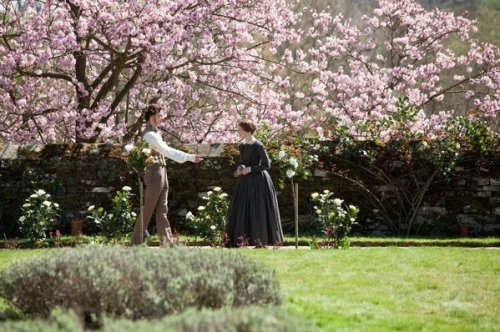I usually feel inadequate when I openly admit that the literary world continuously passes me by. This issue is exacerbated further when a decent amount of people around me are devout readers. But I’ve always been a visual person and picking up a book and reading isn’t nearly rewarding as taking in the visual feasts the film world has to offer. Despite my lack of interest in reading, I feel it also favors me when it comes to judging book to film adaptations. Often when it comes to adaptations, people take the film’s source material verbatim and feel a sting of disappointment when the film fails to capture every aspect of their beloved book. With these preconceived notions, a film is overlooked in favor of what it could’ve been or what should’ve been as dictated by the viewer. Not that this is always case, but my lack of literary prowess allows me to enter into a film like Jane Eyre with no expectations.
Coming along with my fresh slate is also an ignorance that misinforms me. For the longest time I thought Jane Eyre was a book written by the venerable Jane Austen. Sadly, I was quickly taught that it was Charlotte Bronte. Maybe I should read more? Oh well, as many of you probably know, Jane Eyre is the tale of a woman (Mia Wasikowska) who blossoms into a strong and independent entity amidst a romance with the powerful Mr. Rochester and his mysterious past. Although Mr. Rochester’s past is unknown until his life divulgences send Jane away, the narrative of Jane Eyre skips back and forth between the past and present, the anguish and calm strength. As we find out, Jane’s young life was interrupted after the death of her parents. If her parent’s death weren’t enough, Jane is sent to an egregious boarding school after an unsavory stay with her aunt. It’s at this boarding school that Jane’s resolve is tested and reaffirmed. Years after her induction to the school, Ms. Eyre finds work as a governess at Thornfield Hall, the residence of a one Mr. Rochester. It’s here where Jane’s assured female posture faces its greatest challenge in the brooding and perplexing Mr. Rochester. Both are undeniably evenly matched as they face off in verbal sparring matches that are not only telling of the individuals they are, but also the potential kinetic romance they will conceive.
The bulk of the film resides in the developing romance between Jane and Rochester, and it’s when the film is clicking on all cylinders. The film’s screenplay, wonderfully constructed by Moira Buffini, establishes the budding romance between these two polar opposite stalwarts, but a lot of credit has to go to Wasikowska and Fassbender whose performances are installed with impenetrable determination and seething sexuality. Fassbender is especially terrific considering he captures the majesty and boiling rage of Mr. Rochester in the same capacity as Orson Welles did in the 1944 version. Matching Fassbender is Wasikowska who has likely thrown her hat into the Best Actress race. Her ability to go toe to toe with Fassbender is electric and worthy of any accolade that will be sent her way. Speaking of accolades, let’s go back to the screenplay which boasts a slew of terrific dialogue and banter that is not only reminiscent of the film’s time period, but is genuine, romantic, and entertaining. I’d be surprised if this too didn’t find itself garnering awards attention.

No comments:
Post a Comment